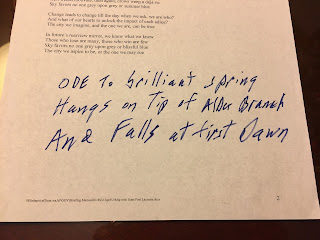This blog post first appeared in Seattle School of Visual Concepts Blog
April is National Poetry Month; across the country there are festivals, readings, workshops, and write-ins that celebrate the power and beauty of words. As Washington State Poet Laureate and as SVC’s Designer in Residence, I created a project to acknowledge the month, and April 26th in particular, which is also known as National Poem In Your Pocket Day.
With abundant help from SVC’s staff; shop director Jenny Wilkson; my Letterpress 2 instructor Amy Redmond; teaching assistant, Chris Copley; and SVC office assistant Carrie Radford, I printed 2,000 miniature letterpress broadsides. On each was a poem, in both Spanish and English, titled “El árbol dentro de mi / The tree inside me,” which will be distributed today by independent bookstores across Washington State.
Michelle Carranza, an 8th grade student at Denny International Middle School in West Seattle, wrote the poem. For the past four years, I have been teaching a series of poetry workshops in Spanish at this school. For the month of January, we wrote poems exploring ways in which humans are interconnected with the natural environment.
Choreographing my right foot, my right hand, then my left hand on the treadle-operated platen press for hundreds of impressions, I was minutely aware that much time had lapsed from the morning in which Michelle, sitting in a bright classroom, wrote the first draft of her poem. The words, thus arranged in this particular composition, travelled a long journey from Michelle’s imagination to a page of college ruled paper, to a relief printing plate, and to the Neenah paper that was their final destination.
Standing at the press, I understood that printing is much like writing a poem. They are both inexact sciences, driven by the mystery of intuition, overseen by the ruler of all things: time. What I mean to say by “inexact” here is not that precision is optional in a printing run. On the contrary, one cannot serialize something that was not exactly measured so that each document is faithful to the one before. The ability to replicate is, after all, the revolutionary power of the printing press. What I mean to say is that in a letterpress print run, adjustments need to be made every step of the way. Human hand and judgment and exquisite tinkering, are needed to attend to all of the details involved: mixing inks to obtain the desired hue, obtaining the right amount of pressure from plate to paper, etc. Said another way, printing requires time. Lots of it.
Unbeknownst to us when we admire a poem — its voice, form, rhyme, content — we are also paying tribute to Mother Time. Poets spend hours, sometimes years, working with a poem to reach full expression of the thing which intuition sparked. Likewise, when we admire a hand printed object, time is one of the components inherent in our admiration, whether we are aware of it or not.
The poem could not be shaped, the printed object could not be created without time’s filaments threading through them. Time hangs from every letter like dew hangs at dawn over every blade of grass in a spring meadow. Human awareness is needed to create and to behold that something eternal and unmeasured, that thing that catches our breath, that thing we call art.
El árbol dentro de mi
En el río de los recuerdos
las raíces de mi árbol
buscan la seguridad
de un lugar de siempre
caras familiares
amigos del pasado
el tronco fuerte y alto
resiste como un faro
la tormenta de pensamientos
no se deja caer
aunque las olas
lo empujen y empujen
entre el vacío de las palabras
y el silencio de mi cuerpo
aún asi, mis ramas tratan
de alcanzar una aventura
lejana entre planetas y estrellas
las raíces de mi árbol
buscan la seguridad
de un lugar de siempre
caras familiares
amigos del pasado
el tronco fuerte y alto
resiste como un faro
la tormenta de pensamientos
no se deja caer
aunque las olas
lo empujen y empujen
entre el vacío de las palabras
y el silencio de mi cuerpo
aún asi, mis ramas tratan
de alcanzar una aventura
lejana entre planetas y estrellas
Michelle Carranza
8th Grade
Denny International Middle School
8th Grade
Denny International Middle School
The tree inside me
In the river of memory
the roots of my tree
search for security
yesterday places
familiar faces
friends of the past
my trunk, strong and tall
resists like a lighthouse
thunderstorms of thought
it refuses to fall
even after
wave after wave shove it
between the emptiness of words
and the silence of my body
even then, my branches clamor
a far away adventure
among planets and stars
the roots of my tree
search for security
yesterday places
familiar faces
friends of the past
my trunk, strong and tall
resists like a lighthouse
thunderstorms of thought
it refuses to fall
even after
wave after wave shove it
between the emptiness of words
and the silence of my body
even then, my branches clamor
a far away adventure
among planets and stars
Translation Claudia Castro Luna
WA Poet Laureate
WA Poet Laureate








